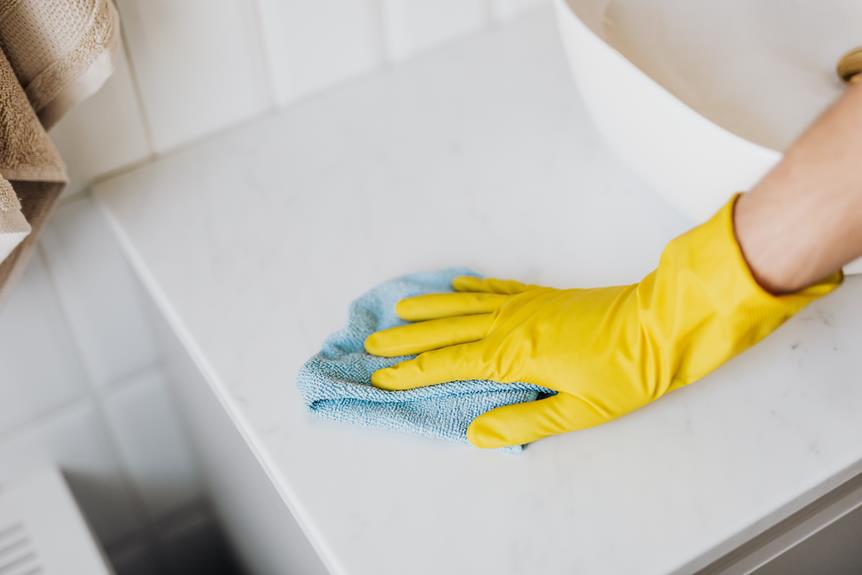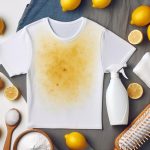Tired of those pesky water stains ruining your favorite polyester fabrics? Don't worry, we've got you covered with 5 effective ways to banish those stains for good.
From the simplicity of a vinegar and water solution to the power of a hydrogen peroxide treatment, these methods will have your polyester looking fresh and clean again in no time.
No need for expensive cleaners or complicated processes – just a few simple ingredients and techniques that you can master easily.
Say goodbye to water stains and hello to pristine polyester with these tried and true methods.
Key Takeaways
- Vinegar-based methods, baking soda method, citrus juice treatment, and hydrogen peroxide method are effective ways to remove water stains from polyester fabric.
- Using a mixture of white vinegar and water, or a paste of baking soda and water, can help remove water stains.
- Citrus juice, such as lemon, lime, or orange juice, can also be used to treat water stains on polyester fabric.
- Steam cleaning is another technique that can be used to remove water stains, but professional assistance may be needed for stubborn stains.
Vinegar and Water Solution
To remove water stains from polyester fabric, mix a vinegar and water solution in a spray bottle and apply it to the stained area. Vinegar is an effective and natural fabric softener alternative that can help break down the minerals in water stains. The acidic nature of vinegar makes it a powerful agent for tackling stubborn water marks on polyester fabric.
When creating the solution, mix equal parts of white vinegar and water. Once the solution is ready, gently spray it onto the water-stained area of the fabric. Ensure that the fabric is damp but not soaked and allow the solution to sit for a few minutes. Afterward, gently blot the area with a clean cloth, working from the outside of the stain towards the center.
This method not only helps to remove water stains but also serves as a preventive measure against future stains. Additionally, incorporating stain prevention tips, such as using coasters for drinks and avoiding placing wet items on polyester fabric, can help maintain the fabric's pristine condition.
Baking Soda Paste
If vinegar and water solution didn't completely remove the water stain, you can try using a baking soda paste to tackle the remaining discoloration. Baking soda is a versatile ingredient that's often used for stain removal and fabric care.
To make a baking soda paste, mix baking soda with water until it forms a spreadable consistency. Apply the paste directly onto the water-stained area of the polyester fabric and gently rub it in using a soft cloth or sponge. Let the paste sit on the stain for at least 30 minutes to allow it to effectively absorb the moisture and lift the discoloration.
After the allotted time, rinse the area with cold water and blot it with a clean towel to remove the baking soda residue. Check the stained area to see if the water stain has been lifted. If necessary, you can repeat the process until the stain is completely removed.
Baking soda is a gentle yet effective option for treating water stains on polyester fabric, and it can be a valuable addition to your fabric care routine.
Lemon Juice Treatment
You can apply lemon juice directly onto the water-stained area of the polyester fabric to help remove the water stain. Lemon juice is a natural fabric cleaner that can effectively break down and lift water stains from polyester. The citric acid in lemon juice acts as a mild bleaching agent, helping to lighten and remove the water stain. Here's a simple way to use lemon juice to treat water stains on polyester fabric:
| Steps | Instructions |
|---|---|
| 1. | Squeeze fresh lemon juice onto the water-stained area. |
| 2. | Gently rub the lemon juice into the fabric using a soft cloth or sponge. |
| 3. | Allow the lemon juice to sit on the fabric for about 15-30 minutes. |
| 4. | Rinse the treated area with cool water and let it air dry. |
If you don't have fresh lemons on hand, you can also try using citrus fruit alternatives such as lime juice or orange juice, as they also contain citric acid. However, keep in mind that natural fabric cleaners like lemon juice may cause slight color changes in the fabric, so it's essential to test a small, hidden area first.
Hydrogen Peroxide Method
Periodically, apply a small amount of hydrogen peroxide directly onto the water-stained area of the polyester fabric. Hydrogen peroxide is a fantastic stain remover and can work wonders on water stains. It's essential to test a small, inconspicuous area of the fabric first to ensure that the hydrogen peroxide won't cause any discoloration.
Once you've confirmed that it's safe to use, grab a clean cloth and dampen it with the hydrogen peroxide. Gently dab the stained area, being careful not to rub too vigorously, as this may damage the fabric. Allow the hydrogen peroxide to sit on the stain for a few minutes, then rinse the area with cold water.
After rinsing, launder the fabric as usual, following the care instructions. This method is effective for treating water stains and is a great addition to your fabric care routine. Remember, always check the fabric care label and test any stain removal method in a small area before applying it to the entire stain.
Steam Cleaning Technique
When tackling water stains on polyester fabric, consider using the steam cleaning technique as an effective method. Steam cleaning is a gentle yet powerful way to remove water stains without damaging the fabric. The high temperature of the steam helps to lift the stain and restore the fabric's appearance. Here's how you can use the steam cleaning technique to effectively remove water stains from polyester fabric:
| Steps | Instructions |
|---|---|
| Prepare the steamer | Fill the steamer with water and allow it to heat up according to the manufacturer's instructions. |
| Test on a small area | Before treating the entire stained area, test the steam on a small, inconspicuous area of the fabric to ensure it doesn't cause any damage. |
| Steam the stained area | Once the steamer is ready, hold it a few inches away from the stained area and gently steam the fabric, focusing on the water-stained areas. |
Remember that some water stains may require the expertise of a professional. In such cases, the dry cleaning process or a hot iron treatment might be necessary to effectively remove the water stains from polyester fabric.
Frequently Asked Questions
Can Polyester Fabric Be Safely Treated With Bleach to Remove Water Stains?
You can safely treat polyester fabric with bleach to remove water stains, but exercise caution. Always test a small area first and dilute the bleach. Lemon juice can also work, but be mindful of potential discoloration.
Are There Any Specific Types of Polyester Fabric That Should Not Be Treated With the Lemon Juice Treatment?
When it comes to fabric types, some specific polyester fabrics, like acetate and rayon, should not be treated with lemon juice alternatives for stain removal. Always check the care label before using any cleaning method.
Can the Hydrogen Peroxide Method Cause Discoloration or Damage to Certain Colors of Polyester Fabric?
Hydrogen peroxide may affect color fastness in some polyester fabrics. To ensure fabric care, consider spot testing in an inconspicuous area first. If concerned, try alternative stain removal techniques like vinegar or baking soda.
Is It Safe to Use a Steam Cleaning Technique on Delicate or Heat-Sensitive Polyester Fabrics?
Using a steam cleaning technique on delicate or heat-sensitive polyester fabrics can be safe if done carefully. However, be cautious with heavily stained fabric, as excessive heat or moisture may set the stains.
Are There Any Potential Negative Effects of Using the Vinegar and Water Solution on Heavily Stained Polyester Fabric?
Using a vinegar and water solution on heavily stained polyester fabric may have potential risks, like discoloration or damage. It's best to test on a small area first. Safe alternatives include using mild detergent or seeking professional cleaning.
- The Use of Nonwovens in Construction and Civil Engineering - July 11, 2025
- The Use of Nonwovens in Construction and Civil Engineering - July 11, 2025
- The Use of Nonwovens in Construction and Civil Engineering - July 11, 2025






